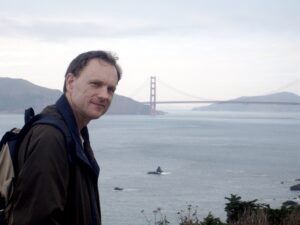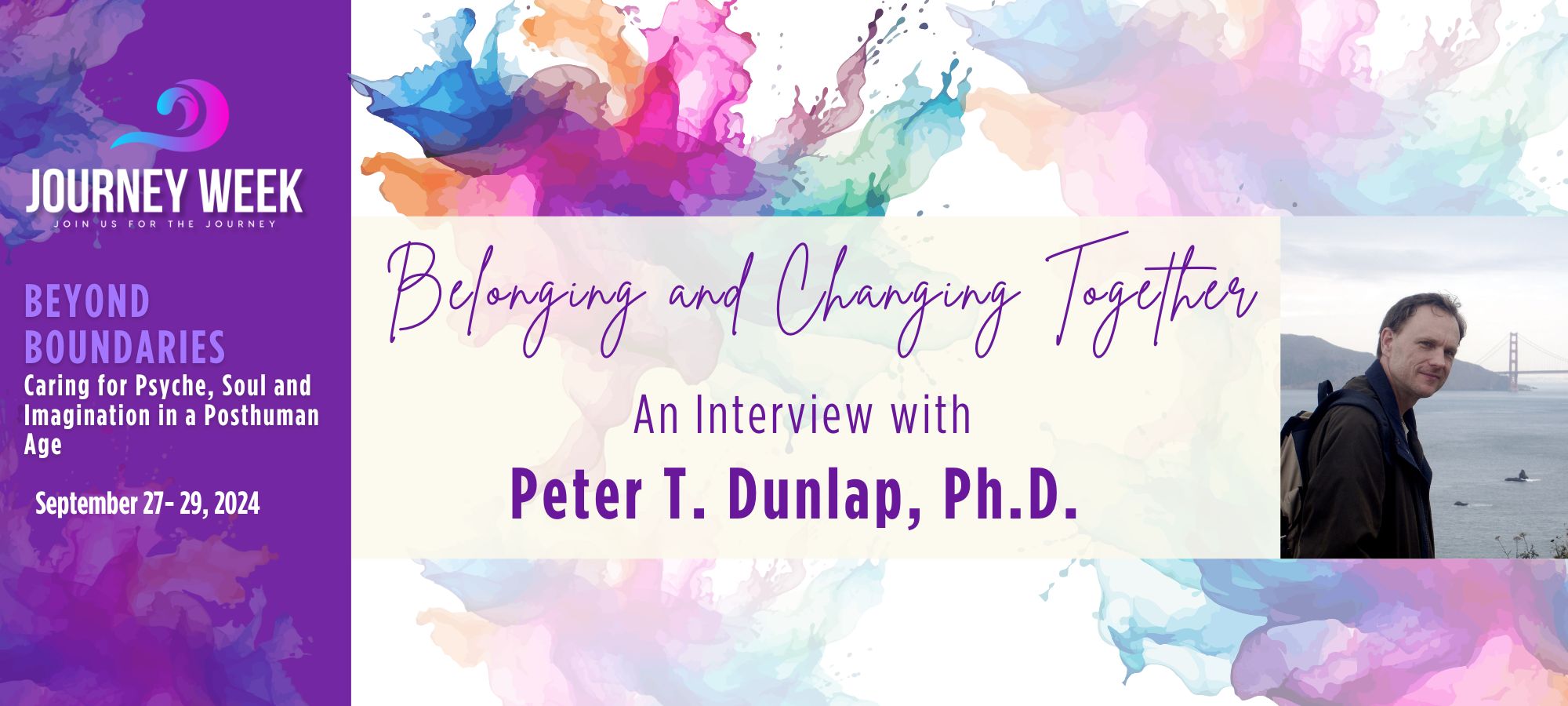Peter T. Dunlap is not only the Co-Chair of Pacifica’s M.A./Ph.D. Clinical Psychology program, he will also be part of the three-scholar panel “Belonging and Changing Together: Transforming our Ideologies into Practices of Shared Becoming” during Pacifica’s Journey week. Journey Week is an immersive week of learning and connecting at Pacifica Graduate Institute, September 27th – 29th, 2024. For more information and to register, visit us here. I’m delighted to speak with Peter about his work and Journey Week.
Angela Borda: Thank you so much for speaking with me today. I’m looking forward to Journey Week, where you will be presenting “Belonging and Changing Together: Transforming our Ideologies into Practices of Shared Becoming” with Camille Harris, Ph.D. (Pacifica Co-Chair & Core Faculty, Clinical Psychology) and Kevin Volkan, Ph.D. (Pacifica Core Faculty, Clinical Psychology). What does “shared becoming” mean and how might it impact our ideologies?
Peter T. Dunlap: We are meant to help one another become our best selves while also engaging in helping our communities. This combines personal growth with community engagement. When we integrate the inner psychological with the outer social and political, a new idea of service emerges. Our personal development is heightened when it is directed toward service. This is our shared becoming. This is how we become, together, the people called for by our time.
Ultimately this work is in response to the tragic loss of belonging that has led to an epidemic of loneliness, not just in Western culture but around the world. I really do see the opportunity of our time to gather to practice bringing out the best of each one of us while we focus our attention on creating the shared experiences needed to foster healing, justice, and belonging values.
Angela: Your website begins with “We can pull ourselves back together. By using psychological practice, we can activate community leadership, cultivate fellowship, and reestablish the essential experience of belonging.” What are we pulling ourselves back together from that makes belonging and community seem further away?
Peter: As transformative as the 1960s were, there’s a reason why conservatives are aghast at what has happened over the last 50 years. I’m not a conservative, but there once were community organizations that held communities togethers. These organizations attracted members across socioeconomic and ideological lines, they brought us together to form community and to engage in service work. Unfortunately, too many of these organizations have lost membership. While I am not advocating returning to their worldview; I do want us to learn anew how rich and poor, Democrats and Republicans can gather to care for their communities.
And this is where I think psychology has something unique to offer as it helps us develop our curiosity about how we can change ourselves and how we can communicate across big differences, like wealth and ideology. In such gatherings we can reconnect to some experience of our shared, common interests within community, and do that in a way that attends to the loneliness and the alienation that has beset us. We’re missing some understanding of the loss of community that haunts us.
Angela: Is hyper individualism part of this?
Peter: Yes. There was a communal spirit that came in the 1960s that was beautiful and brilliant, but it led to identity politics, where there are 37 different types of liberalism, 20 types of feminisms, and 100s of separate projects helping the environment. It ended up that there was a lot of division within these liberal and progressive initiatives. By the end of the 1970s, we had divided into such small groups that we lost the cohesiveness needed to have an impact. We lost our psychological, social, and political momentum. That was part of what opened the door to Ronald Reagan and Margaret Thatcher. The stories they told made individualism the centerpiece, and this haunts us to this day, this hyper individualism, the idea that every person should put themselves ahead of their communities.
Angela: This is an election year, so the political is on high volume, and people are naturally going to have strong feelings. What can Jung or depth psychology bring to this? How does psychological practice offer a way through?
Peter: A great question. The first step of depth psychology is always projection withdrawal, which simply means that we examine our own inclination to hate, disparage, and go into outrage when people think differently than we do. This step begins in humility. So, even though I will vote with relish and excitement, I also have an eye on myself and my friends to see if and how we’re contributing to the problem. My enthusiasms are trustworthy right up to the point that they begin to demonize others, right up to the point where I find a little too much pleasure disparaging people who think differently than I do.
While I don’t back down from my ideology, I am a progressive, I also know we don’t have all the answers and that in fact we have our own prejudices, biases. So, the first step is to put my ideology in check, so I can lead with the psychological mindset that humbles me, keeping me from contributing to the polarizations that harm our communities, giving me a better chance at being helpful. The current moment isn’t just about national or local politics, it’s about how we treat one another in our communities and organizations. Depth psychology doesn’t belong just in the classroom or office, it doesn’t just belong at home; we must bring it into our neighborhoods, school boards, and city councils, and into the organizations where we work.
Angela: In the realm of community and fostering change together, Journey Week seems like an appropriate context for your panel. What has your experience of Journey Week been and what are you most looking forward to?
Peter: I had the pleasure of attending last year and loved that people come together on such a beautiful campus for meals, to listen to one another, to engage in conversation, and to imagine shared futures. Journey Week is hopeful in these divisive times. My spirit brightens when I gather with people who honor depth psychology through the development of self-awareness, empathy, community engagement, and the cultivation of our shared purpose.
Angela: What do you most enjoy about being co-Chair of the M.A./Ph.D. Clinical Psychology program at Pacifica?
Peter: During the three years I’ve been co-Chair, the Clinical Psychology program has taken big steps toward integrating and extending our values. We have always been committed to the psychotherapeutic practices that bring about healing. We have always placed such depth work within the context of pursuing social justice. We are learning that these can be integrated as we respond to the crisis of loneliness and cultivate belonging values. This new focus makes our conversations more immediate and more intimate. And all of this takes place within our tradition of working together within the cohort model. By gathering our students in groups and guiding them through the curriculum, the cultivation of belonging values becomes more active and conscious. This creates the atmosphere within which students, staff, and faculty can focus on the larger project of our shared becoming.
At the heart of this is our commitment to engaging one another psychologically. We don’t just talk about psychology; we don’t just do theory. We commit to doing psychology, to being psychological.
Angela: Is there anything new in the M.A./Ph.D. Clinical Psychology program or in your own research that you’re excited about?
Peter: Both. The Clinical Psychology program is returning to a vision of research development, responding to the critical questions of our time for the sake of working out collaborative answers to those questions. The faculty are all bringing their own research interests to the table. We ask “What is the fullest vision of depth psychology? What is depth psychology capable of contributing to the world as we know it now?” Certainly, this includes responding to individual suffering, mental illness, responding to anxiety, depression, and communication issues in a clinical setting. However, that is just the beginning. Our success in those areas is the success of 20th-century clinical psychology. In the 21st century, the projects of psychology expand to be responsive to the needs of our communities and leaders. We are turning our attention toward community engagement.
This focus emphasizes what we have in common, which becomes a higher point of interest than our differences. While we must continue to make room for our differences, to explore them and celebrate them, it is also time to find ways of stitching ourselves back together, to cultivate the shared attention that will enable us to resolve the critical questions of our time, whether that is climate change, social injustice, or the crisis of loneliness.
Angela: Thank you for your time today, and I look forward to hearing you talk at Journey Week!
Journey Week is an immersive week of learning and connecting at Pacifica Graduate Institute, September 27th – 29th, 2024. For more information and to register, visit us here.

Peter T. Dunlap is a psychologist working in private and political practice. He is engaged in research at the interface between C.G. Jung’s thinking about the role of the psychological attitude in the future transformations of the human species, systems-centered group theory and practice, and emotion-focused psychotherapy for individuals and groups. He leads a weekly Hope and Leadership group for progressive activists and community leaders as well as offering workshops and seminars on psychological leadership. He is the author of Awakening our Faith in the Future (Routledge), numerous book chapters, journal papers, and magazine articles focusing on founding a distinctive Jungian political psychology and on a new type of “psychocultural practitioner” engaged in training community leaders in the cultivation of a “public emotional intelligence.” Over the last 10 years Peter has been deeply involved in the international Jungian communities serving on boards of the International Association of Jungian Studies (IAJS) and the Jungian Society for Scholarly Studies (JSSS). He has also been a guest editor of the Journal for Jungian Scholarly Studies. Peter has brought his interest in group transformative practice to numerous Jungian conferences to support these communities to explore the work of forming conscious groups. www.petertdunlap.com.

Angela Borda is a writer for Pacifica Graduate Institute, as well as the editor of the Santa Barbara Literary Journal. Her work has been published in Food & Home, Peregrine, Hurricanes & Swan Songs, Delirium Corridor, Still Arts Quarterly, Danse Macabre, and is forthcoming in The Tertiary Lodger and Running Wild Anthology of Stories, Vol. 5.


